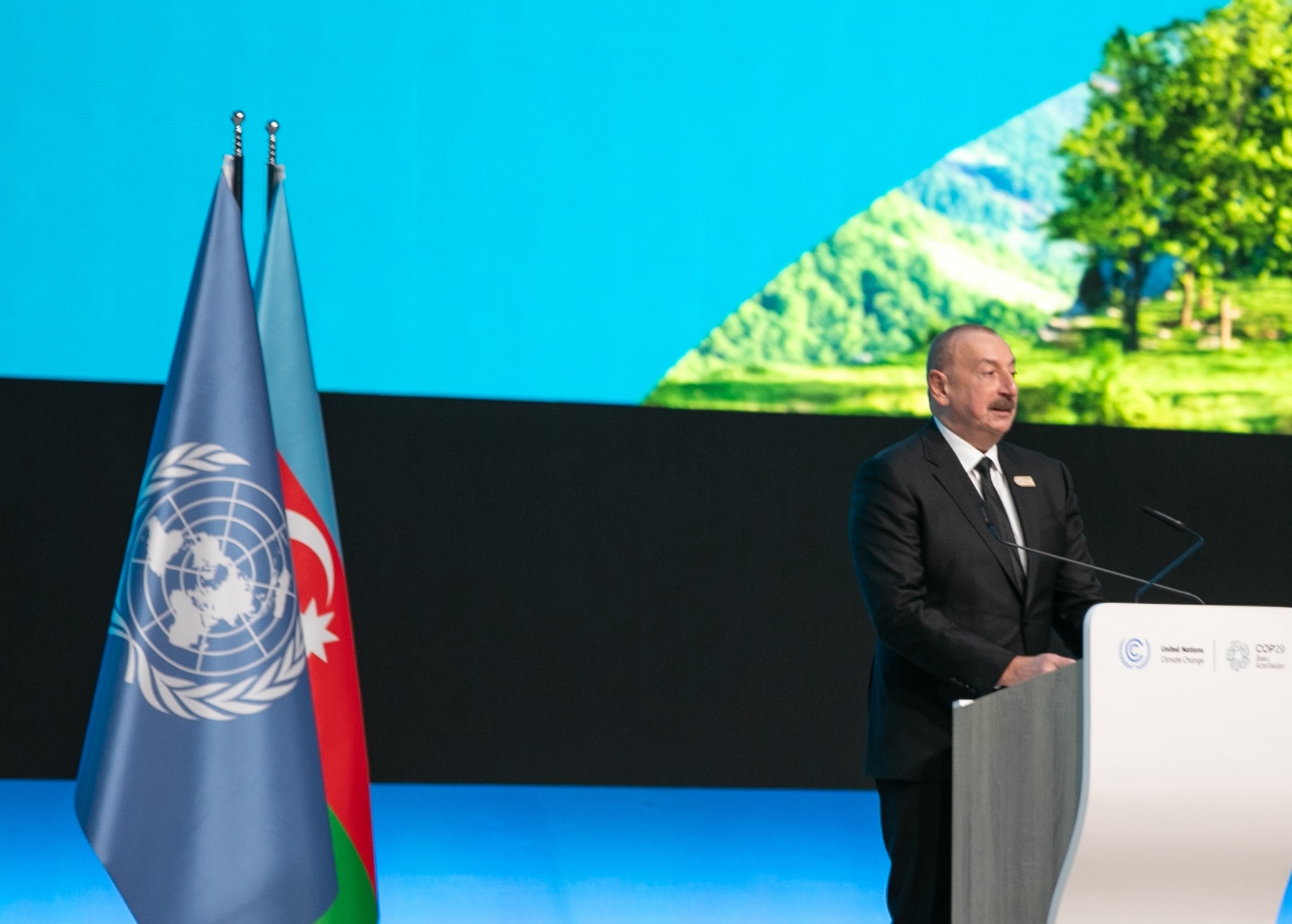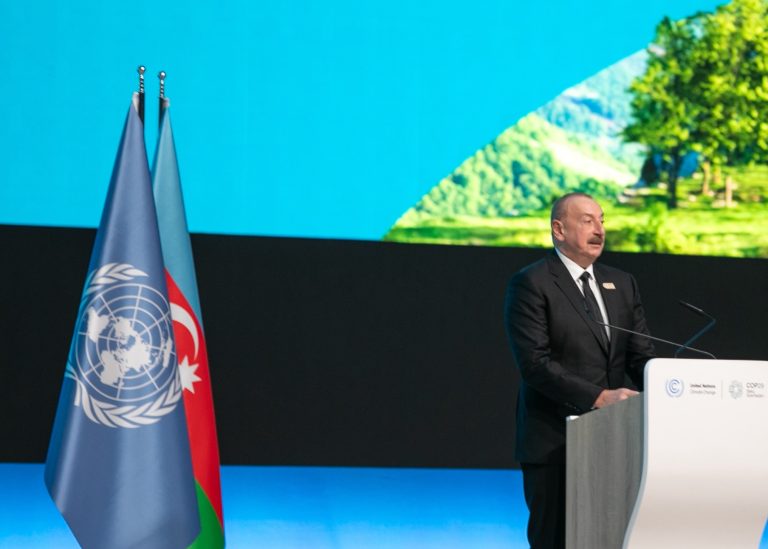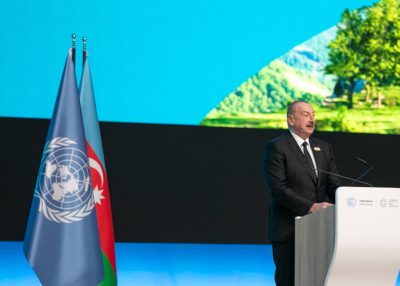Photo: Kiara Worth (UN Climate Change) 2025-01-10
Photo: Kiara Worth (UN Climate Change) 2025-01-10
“Western politicians have to change their attitude towards Azerbaijan,” says exiled journalist Leyla Mustafayeva, whose colleagues remain behind bars in Azerbaijan, where world leaders gathered for the COP29 summit to discuss climate solutions. Despite the global spotlight, Azerbaijan’s relentless crackdown continued, with new arrests and fabricated charges targeting journalists and activists in a chilling display of power.
World leaders, lobbyists and businessmen gathered in Baku, Azerbaijan in November 2024 at the Olympic Stadium for COP29 – the UN Conference of the Parties environmental summit. Just a few kilometers away in a pre-trial detention center, journalists are still imprisoned and assaulted for reporting on the regime and the corruption of president Ilham Aliyev and his family network.
After the end of the COP29, the arrests continued. On the evening of December 6, 2024, six journalists, five of whom are employees of Meydan TV and one who works as an independent reporter, were arrested on charges of smuggling of foreign currency to Azerbaijan. Meydan TV has headquarters in Berlin and their website is blocked in Azerbaijan since 2019. Some of these journalists’ houses were searched and personal equipment was seized.
This most recent wave of what are widely believed to be fabricated and politically motivated charges against journalists and activists started with the military operations in Nagorno-Karabakh in 2023, and have been continuing ever since. The current media crackdown in Azerbaijan did not stop even with the global attention the country received as a result of the climate conference.
In Transparency International’s 2023 Corruption Perceptions Index, Azerbaijan received 23 out of 100 possible points, translating into a ranking of 154th place among a total of 180 countries included. The World Press Freedom index put Azerbaijan on the 164th place out of 180 in its Reporters Without Borders 2024 index, recording 19 currently ongoing legal cases against journalists or media workers. Human rights organizations reported that more than 230 people were imprisoned for politically motivated charges, twice the amount of the previous year.
As also reflected in these numbers, Azerbaijan is a country well-known for human rights violations, including the imprisonment of activists and journalists – as well as for fossil fuel lobbying. Despite this being common knowledge, nearly 70,000 delegates from around the world, including the European Union and Central Europe, registered for the COP29 Baku meeting between November 11-22, 2024 (the conference counted roughly 56, 000 participants, with some 54,000 coming in person and the rest viewing it online).
The official goal of COP29, the first COP organized in a former Soviet republic, was to accumulate finances to reduce carbon gas emissions and move towards reaching the UN’s climate goals. The stated aim was to help lower-income countries make the transition to zero-carbon emissions. According to the Paris Agreement of 2015 and the United Nations Framework Convention on Climate Change, the money should come from the high-income countries that are historically responsible for the climate crisis. Developed countries are supposed to provide at least 300 billion dollars annually by 2035 for developing countries.
However, some countries’ representatives left Baku disappointed, criticizing the finance goals as unambitious, perpetuating current inequalities between “developed” and “developing” countries. The United States participated through the COP29 negotiations but without President Joe Biden. The US leader only issued a statement once the conference was over. Chinese President Xi Jinping and Indian Prime Minister Narendra Modi also decided to skip the conference. Heads of governments of Japan and Canada, Germany and the president of Brazil didn’t participate either. These countries are among the 13 that are the biggest carbon polluters.
Meanwhile, all Visegrád Four countries’ leaders came to Baku and presented “national statements” in the opening of the conference, stating their sustainability visions.
Polish President Andrzej Duda started the conference off by refusing to take the official group photo because the president of Belarus, Aleksandr Lukashenka was present. In his speech, he highlighted how wars undermine environmental efforts. Slovakia’s Peter Pellegrini spoke about how Slovakia shut down the last coal mine in the country in 2023 and “recently” closed the last remaining coal power plants. He envisioned Slovakia’s energy future as a nuclear and renewables net exporter and spoke of how Slovakia “already” helps with Ukraine’s supply of energy.
Czech Prime Minister Peter Fiala joined the nuclear support wave, and also had a meeting with president Aliyev, thanking him for releasing a detained Czech citizen. The odd one out was Viktor Orbán, who advocated for not giving up on fossil fuels: “We must continue advancing the green transition, while also maintaining our use of natural gas, oil, and nuclear energy,” he said. He also criticized “unrealistic quotas and burdensome rules” for farmers and companies.
How COP29 ended up in Azerbaijan
Traditionally, the climate conference is organized in a different part of the world every year, rotating between the five UN regional groups, which then determine among themselves which country will host with a vote. The last step is a fact finding mission on the preparedness of the proposed country by the United Nations Framework Convention on Climate Change secretariat.
The Eastern European group thus had to reach consensus on the organizer for 2024. This turned out to be difficult, since Russia blocked all potential candidates that had spoken out over Russia’s invasion of Ukraine. This is how the last potential candidates ended up being Armenia and Azerbaijan, which have their own long history of conflict. The hosting position was in a stalemate – both countries were opposed to the other’s candidacy. In the end, Armenia agreed not to block Azerbaijan — and announced a deal with Azerbaijan that ensured the exchange of 32 captured Armenian service members for two Azerbaijani soldiers. The two countries were showing their “intention” to “normalize” relations, they said in a joint statement.
“Being elected by unanimous decision as the host country for COP29 is really a big honour for us. We consider it as a sign of respect from the international community to Azerbaijan and what we are doing, in particular, in the area of green energy,” said Aliyev in a statement on the COP29 main webpage.
Aliyev has been the president of Azerbaijan since 2003. The fossil fuel industry is the leading economic export, with petroleum and natural gas industries responsible for over 90 percent of revenue and approximately a half of the state budget. COP29 may have served to support Azerbaijan’s claims that it is moving towards sustainable transition. Aliyev even proposed adding “ecocide” to the country’s Criminal Code in a new bill. But in the conference final declaration, there was no commitment to phase out fossil fuels.
Meanwhile, as Western and Central European leaders discussed climate issues, Aliyev’s regime ensured that journalists exposing both corruption and environmental destruction by the president’s cronies were silenced.
Arrests of journalists are nothing new
A preparatory hearing for six journalists from AbzasMedia, a non-profit independent news outlet, and Radio Free Europe journalist Farid Mehralizada began at the Serious Crimes Court on December 17, 2024. Families faced difficulties entering the courtroom, and colleagues who intended to cover the trial were turned away at the door. Only a few accredited diplomats from Western embassies were allowed in. A further trial on the merits was scheduled for December 28.
The editor-in-chief of AbzasMedia, Sevnic Vagifgizi, filed a motion challenging the composition of judges, citing their history of ruling against political prisoners. During this hearing, after continuous efforts and threats by the defendants to leave the proceedings, journalists were finally allowed into the courtroom. The trial is set to continue on January 21, 2025.
Over 20 journalists and media workers are currently awaiting further trial, from AbzasMedia, online news channel Kanal 13, independent Toplum TV, and Meydan TV.
During their imprisonment, there were reports of journalists’ physical abuse during their imprisonment on November 14, 2024 – while COP29 was well underway. After complaining about the poor ventilation in the cell, Sevinj Vagifgizi, the AbzasMedia editor-in-chief’s arms were reportedly crushed in the door windows by the prison guards.
While activists, human rights defenders and journalists are imprisoned, their colleagues are working from exile. Communication with the imprisoned journalists is difficult. Leyla Mustafayeva, the interim editor-in-chief of AbzasMedia currently in exile, spoke to VSquare.
“Sometimes we send information with permission through their parents, but it is not possible to talk with them openly. Even the parents can’t talk with them because they are allowed to talk through the glass and phones. Which means that the phones are tapped by the prison guards,” said Mustafayeva.
As is often the case in Russia, the grounds on which journalists are arrested are related to alleged foreign influence, and such persecution ultimately forces independent media out of the country. In November 2023, the director of AbzasMedia, Ulvi Hasanli, was arrested in Baku, after law enforcement supposedly found 40,000 euros in cash at the outlet’s headquarters; Hasanli told reporters before his arrest that he believed the money had been planted so that he could be accused of smuggling foreign currency. The imprisoned journalists are currently facing 8 to 12 years in prison.
“The criminal case that they have launched is based on the 2000 [media regulation] rules. But the policeman planted [the money] into the office of AbzasMedia, and they behaved as if they have found this money there,” said Mustafayeva.
“It was placed in the entrance of the office on the cupboard just one meter away from the entrance, so everyone could just just easily take it and go away with a huge sum of money,” the journalist added.
The court did not accept any appeals following the arrests. They also did not, for example, examine fingerprints as the defense lawyers requested. According to Mustafayeva, this further confirms that it was the regime that planted the money in their office.
All the president’s extended family and properties
Charges of foreign influences may strike some as ironic given that investigations have revealed that Aliyev and his family own hundreds of million dollars in property in London . OCCRP published a virtual tour of the family’s London properties, which include commercial buildings, apartments and even a popular pub. The Aliyev family — the president and his three children — have reportedly been sending their money offshore to hide their fortune, as revealed by the Panama Papers investigation in 2016.
Meanwhile, Aliyev’s corruption and economic policies have directly harmed the environment, too. In June 2023, people in west Azerbaijan initiated demonstrations against a reservoir that was going to be used to store waste from a UK-owned goldmine (Anglo-Asian Mining) near the village of Söyüdlü. Cyanide used in gold mining ends up in toxic “sludge,” which residents claim is being absorbed into the soil and rivers, resulting in respiratory illnesses and increased lung cancer rates. This is the story that AbzasMedia investigated, which led to the arrest of its founder.
AbzasMedia was also monitoring the reconstruction of Karabakh and the allocation of state budget to restore the cities and villages destroyed during the war. They found that companies involved in construction were often owned by individuals close to cabinet members and high-ranking officials. But it mattered little in the end.
“After the war, the [Aliyev] family has gained a lot of reputation in the country because Nagorno Karabakh was seen as a very difficult issue… So after the lands came back [Aliyev] gained a huge reputation and became the hero of the nation,” said Mustafayeva.
The entanglement between the climate conference and the country’s alleged corruption goes beyond traditional greenwashing. Emin Agalarov, the son of a pro-Putin oligarch and an ex-son-in-law of Aliyv who has been sanctioned by the Ukrainian government, won a 5.2 million government contract for the accommodation of the conference attendees at the Sea Breeze Resort, a 500-hectare complex.
Additionally, the property of the hotel is on land illegally confiscated from local residents, as confirmed by the European Court of Human Rights in 2021. Among the official partners of the conference were also Silk Way West Airlines (co-owned by Aliyev’s younger daughter), and the Giltex textile company (until 2023, it was a part of Gilan Holding, of which Aliyev’s daughters own a majority stake through a company registered in the United Arab Emirates; many companies owned by Gilan were later transferred to the Aliyev-family-owned PASHA Holding).
“Over the years, there have been a lot of investigations about Azerbaijan by OCCRP or international investigative journalists, also by local journalists, about all the state officials who were complicit in tax evasion, money laundering, violating regulations, and involved in private business, despite the fact that they were also public servants. No one has been brought before the prosecution or the police,” said Mustafayeva.
What would a solution look like? How should Western countries engage with Azerbaijan?
“Western politicians have to change their attitude towards Azerbaijan. Azerbaijan has a corrupt government and the members of this government come to European countries, they receive medical treatment, they spend their summer holidays in Western countries. They are enjoying getting visas from these countries. They have huge assets in European countries. It’s realistic at least to put visa sanctions on those who are violating human rights in Azerbaijan,” the interim editor-in-chief of AbzasMedia added.
Subscribe to “Goulash”, our newsletter with original scoops and the best investigative journalism from Central Europe, written by Szabolcs Panyi. Get it in your inbox every second Thursday!
Tamara is a journalist from Slovakia, currently based in the Netherlands. Besides VSquare, she writes for The European Correspondent.







